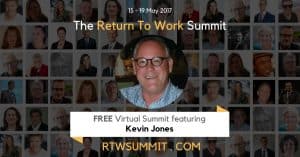 Recently I recorded my contribution to an online conference called the RTW Summit. This conference is first to Australia although other organisations have proposed such a format previously but never eventuated.
Recently I recorded my contribution to an online conference called the RTW Summit. This conference is first to Australia although other organisations have proposed such a format previously but never eventuated.
The conference has been devised and organised by Mark Stipic, a young Return To Work professional who started a podcast recently. He is intelligent and one of those people who is not afraid to take risks in the emerging world of social media.
I decided to participate because the format is exciting and having attended many occupational health and safety (OHS) conferences and a couple of workers compensation seminars and events, I was curious to see how this works from the inside. Mark and I had a conversation for around 40 minutes via Skype. He with a spartan background and close up with microphone, me in my home office hoping that no one got out of bed early and walked behind me through the kitchen semi-naked.
For the International Workers Memorial Day in 2015 I participated in a global internet video hookup and realised that a little bit of effort can truly internationalise the OHS discussion. Australia’s IT infrastructure remains immature but even with those limits, valuable conversations can occur and, because internet and social media content can be recorded, as long as there is an internet or a computer, the OHS knowledge will continue to be accessed. This is a major reason why Safe Work Australia’s Virtual Safety Seminar series is so worthwhile.
Stipic hopes to achieve thousands of bookings from
“… Return To Work Coordinators, Occupational Rehabilitation Providers, Case Managers, Health Professionals and Safety Professionals from around the world …”
It is an achievable aim as the RTW Summit is a FREE event. I have long been in favour of adding to the OHS and safety body of knowledge and even though my blog is now predominantly a subscription service, prior to 2017 the blog was free and contributed thousands of articles. Stipic has been video interviewing speakers for some while now and he has been able to attract top professionals in the field. Just before my interview Stipic was speaking with Dr Mary Wyatt who established Return To Work Matters some years ago. It is an excellent online resource for OHS and RTW professionals. Stipic’s list of conference speakers is impressive.
One of the major benefits of establishing an OHS podcast or online information service is that your professional development increases with every interview. It may be a little selfish in hindsight but it is one of the extra benefits of the recording and interviewing process. Those who talk about safety with lots of people seem to be those who are the more creative thinkers in the profession as the are confronted by new thoughts and have to try to fit them into existing parameters, sometimes rejecting them.
I will be watching or listening to as many of the RTW Summit presentations as possible. I have been told that not all of them are in the interview and conversational style I am most comfortable with. Worker’s rehabilitation is a weakness in my professional experience and RTW Summit seems my best opportunity to gain a better understanding. And by listening to people talk about return-to-work, my OHS understanding of worker health and the prevention of injury or illness recurrence will be broadened.
I hope you will join me in the unique educational experience that RTW Summit promises to be.
